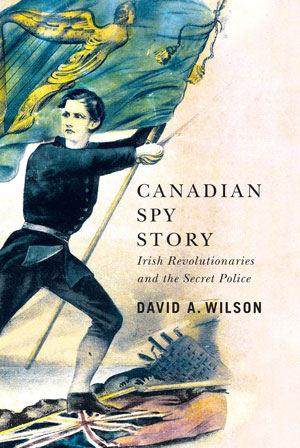CANADIAN SPY STORY: IRISH REVOLUTIONARIES AND THE SECRET POLICE
Published in Book Reviews, Book Reviews, Issue 6 (November/December 2022), Reviews, Volume 30DAVID A. WILSON
McGill–Queen’s University Press
€31.50
ISBN 9780228011170
Reviewed by Dean Jobb
Dean Jobb is the author of The case of the murderous Dr Cream: the hunt for a Victorian era serial killer (Algonquin Books) and teaches non-fiction writing at the University of King’s College in Halifax, Nova Scotia.
Cornelius O’Sullivan was welcomed into the upper echelons of New York’s Fenian Brotherhood, the network of Irish extremists committed to winning their homeland’s independence from Britain. The cattle-dealer from a town near Kansas City, Missouri, made several trips to the city in 1867 to meet Fenian leaders and discuss their plans to invade Canada and strike a blow against the British Empire. He attended Broadway shows with them, learned about their fund-raising efforts and was asked to pass along information to a list of supporters in Missouri. He was even praised in the pages of the anti-British newspaper the Irish American as ‘a patriotic Irishman’.
This ‘model Fenian’, as Toronto historian David Wilson describes him, was also an adept actor and liar. His real name was Charles Clarke and he was a spy for the Canadian government. And while he was Irish-born, his Fenian friends would have been shocked to discover that he was not only a traitor to their cause but a Protestant to boot. Clarke would have been just as surprised to discover that two of the Fenians he encountered as he made friends and gathered information were working as paid informers for the British government.
O’Sullivan/Clarke is one of the undercover agents at the heart of Canadian spy story, a deep dive into the murky, cloak-and-dagger world of the Fenian secret societies behind the plots, threats and terrorist attacks that roiled the Atlantic world in the second half of the nineteenth century—and the spies and informers who laboured to expose them. There’s no better guide to this clandestine landscape than Wilson, a historian and professor of Celtic Studies at the University of Toronto who has written a shelf of ground-breaking books on the Irish experience in Victorian-era Canada.
He traces the origins of the Fenian movement in Britain’s North American colonies, which were on the verge of the political union that formed Canada, as it grew out of violent clashes between Irish Catholics and Orangemen. But the real Fenian threat to Canada was external, not internal, and came from the United States—Irish refugees from the Great Famine and exiled revolutionaries, and battle-hardened Irish-American veterans who fought for both sides in the Civil War. America’s northern neighbours were a tempting target for Irish expatriates who loathed everything British and were itching for a fight. ‘If you can’t reach the heart of England’, noted one Fenian sympathiser, ‘at least dismember a portion of her frame.’
Fenian armies massed on the border and briefly invaded the present-day Canadian provinces of Ontario and Quebec in 1866, in ill-fated attacks that many writers have dismissed as more farce than show of force. The eminent Canadian historian Donald Creighton dismissed the Fenians as ‘a crew of grandiloquent clowns and vainglorious incompetents’. As Wilson demonstrates, however, Fenian incursions and bluster posed a real and existential threat to Canada. The papers of John A. Macdonald, the country’s first prime minister, include thousands of letters and reports documenting efforts to infiltrate their ranks and glean intelligence. ‘I shall spare no expense’, he declared, ‘in watching them on both sides of the line.’
A force of Canadian secret police with a suitably opaque bureaucratic name—the Government Constabulary for Frontier Service—took on the task of playing cat and mouse with the Fenians. Wilson traces the exploits of Clarke, whose career was cut short by a sex scandal, and a number of other operatives, including the most famous of all, Thomas Beach, who went by the grandiose pseudonym Henri Le Caron. The ‘ace in the pack’, as Wilson calls him, Beach spent years working undercover and was trusted so completely that he rose to the rank of general in the Irish Republican Army. At one point he was distributing arms to Fenians stationed on the Canadian border while passing along the information that the British and Canadians needed to stave off their incursions.
Wilson finds lessons for our own time in how democracies can deal with terrorists and extremists by steering ‘a middle course between the imperatives of liberty and the demands of security’. He shows how the Canadian and US governments often worked together to contain the Fenian threat. Macdonald and other Canadian officials rarely resorted to heavy-handed tactics in their shadow war with the Fenians. The prime minister even rebuked an underling who was illegally intercepting and opening packages mailed to ‘suspected individuals’. Restraint was not only necessary to avoid alienating Irish Canadian voters but was also the right thing to do. Macdonald believed that Canada ‘was a country of law as well as order’, Wilson writes, ‘and that the law must not be broken except under extraordinary circumstances’.
Canadian spy story is a remarkable feat of research and scholarship, covering decades of Irish history in North America and beyond as it reconstructs the exploits and once-secret operations of the agents who infiltrated the ranks of the Fenians. The book is thorough and thoughtful enough to please Wilson’s fellow academics, yet clear and readable enough for a general audience. In his acknowledgements, the author notes that he initially planned ‘to write a book that read like a novel but was fully grounded in documentation’. He showed the draft to a couple of historian friends, however, who talked him out of it. That’s unfortunate, because this tale of duplicity, skulduggery and high-stakes drama is tailor-made for scrupulously sourced, creative non-fiction storytelling. Perhaps Wilson will trust his instincts and rework some of this material into the fast-paced, real-life thriller that lurks within these pages. He would be sure to win a wide readership.

















